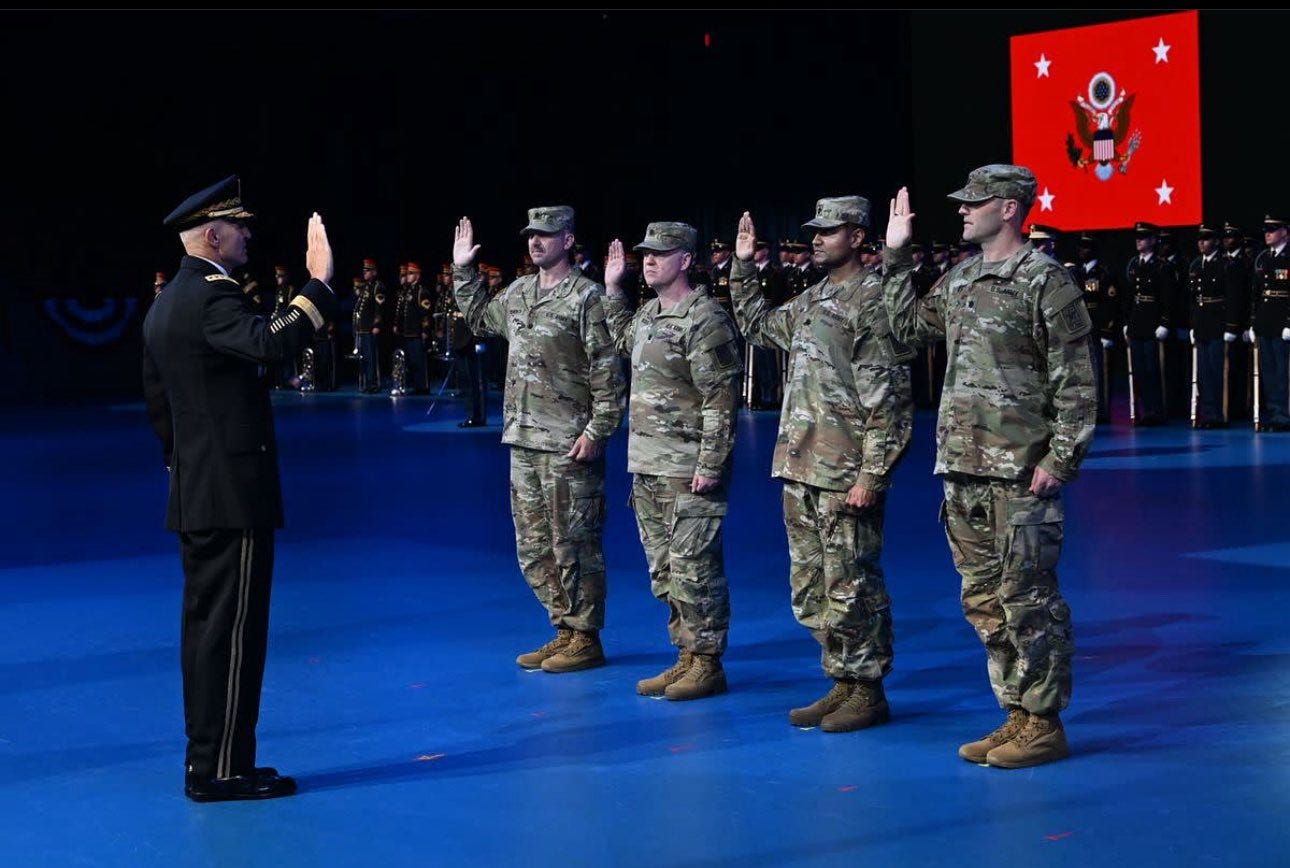Silicon Colonels
The Army recruited four tech visionaries and made them lieutenant colonels. Is this cosplay, modernization—or something else?

When the U.S. Army commissioned four Silicon Valley tech executives as lieutenant colonels in the National Guard this month, the backlash was furious.
“So while real Soldiers risk their life all over the world you decided to swear in a bunch of tech billionaires who will never have to suffer the horrors of war?” one veteran asked on X. Others, like a commenter on Reddit, were less generous. “I’m a mid level major and I’m outraged. Nothing good will come of this and most likely it will lead to espionage, UCMJ, and possible treason.”
The new unit, Detachment 201, is a testbed for injecting private-sector innovation into military modernization, with the added hope that it might make military service look cool again to the high-tech elite.
That’s not a bad idea. The military could learn a lot from Silicon Valley. It took nearly 25 years—a lifetime in the tech industry—to field the V-22 Osprey tilt-rotor aircraft and more than 20 years for the F-35 to be declared ready for combat. The United States will be fighting tomorrow’s war with yesterday’s Army.
The risk, however, is that the military has given these four Silicon Colonels influence—or the appearance of influence—over billion-dollar contracting decisions, technology adoption, and maybe even life-and-death decisions.
Rank, Without the Risk
Detachment 201 is billed as part of the broader Army Transformation Initiative, which aims to make the force leaner, smarter, and—in Defense Secretary Pete Hegseth’s favorite phrase—“more lethal.” These newly commissioned officers will serve part-time as senior advisors, helping military leaders “deliver scalable tech solutions to complex problems.”
Peer beneath the press release, however, and you see four men “serving” in an undefined advisory capacity, with unclear chains of command and no disclosed oversight. The Army hasn’t said what authority—if any—these officers wield over contracts, requirements, or access to classified systems. But having empowered but unaccountable officers on both sides of billion-dollar contracting decisions is a recipe for trouble.
The Silicon Colonels won’t be leaving their day jobs. Task & Purpose reported that they will get an abbreviated version of the six-week Direct Commission Course at Fort Benning, Georgia, that will consist of “up to two weeks of online and face-to-face training.” They also won’t have to pass the Army Fitness Test, a detail that surely grates on the workout-obsessed defense secretary.
It’s not the first time the Army has turned to civilians in uniform. The Army regularly offers direct commissions to doctors, nurses, and other medical professionals. During World War II, more than 100,000 were directly commissioned in a single year—even General Motors president William Knudsen was made a three-star general to oversee wartime production. Those wartime commissions, however, came with real service, real sacrifice, real risk, and real accountability. None of that applies here.
Let’s be honest: The Silicon Colonels aren’t about to give up the promise of gargantuan fortunes that have tied them to their jobs. Take Andrew “Boz” Bosworth. In addition to pulling down a salary just shy of a million bucks (plus a bonus) as Meta’s CTO, he’s been promised 1.38 million shares of Meta through its Restricted Stock Unit program. If he were fully vested today, those shares would be worth nearly a billion dollars—not bad for a guy whose division has become a corporate bonfire.
That division? Reality Labs—the place Boz founded and still runs—has spent over $60 billion trying to get people to strap on VR headsets for silly legless cartoon meetings and virtual ping pong. Don’t worry, Meta has now teamed up with Anduril Industries to build EagleEye, a mixed-reality helmet for the U.S. Army. It’s a dream come true: a customer that will pay obscene prices for a headset no one wants as long as someone says it “enhances lethality.”
Ok, maybe I’m being a little unfair to Boz because the deeper problem isn’t the cosplay or even the waste of taxpayer money. It’s that the corporate officers wearing the uniform may have a say in some of the military’s toughest decisions.
From Benefiting Humanity to the Kill Chain
Two other Silicon Colonels are Kevin Weil, chief product officer at OpenAI, and Bob McGrew, a former chief research officer at OpenAI. Just days before they accepted their commissions, OpenAI secured a one-year, $200 million contract with the Defense Department to deploy advanced AI tools for “national security missions.” It’s a lucrative deal—and a curious one for a nonprofit whose charter promised to develop AI for the benefit of humanity. The timing alone raises eyebrows, but it also sharpens a deeper contradiction: how does a company tasked with building safe, transparent AI reconcile that mission with military systems that must operate in secret?
The final Silicon Colonel is playing a far subtler, and arguably more consequential, game. That would be Shyam Sankar, Palantir’s CTO, and the brain behind Detachment 201.

